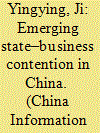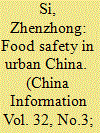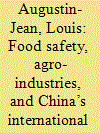|
|
|
Sort Order |
|
|
|
Items / Page
|
|
|
|
|
|
|
| Srl | Item |
| 1 |
ID:
162352


|
|
|
|
|
| Summary/Abstract |
Based on an in-depth case study of a business association, this article explores how private entrepreneurs are organizing for their rights and highlights contentious facets of the state–business relationship in China. In contrast to depictions common in the literature, this business association actively asserts and seeks to maintain its autonomy vis-a-vis the state and uses innovative strategies to strengthen its own organizational cohesion. It organizes collective actions to defend members’ interests and to enhance the transparency and accountability of the local government. It even advances universal values, such as equal rights to justice. Importantly, however, the initiation and effects of collective actions are contingent on the opportunities embedded in China’s fragmented governance structure. I argue that corporatist analyses characterizing Chinese business associations as lacking autonomy and as partners of the state have overlooked such associations’ potential to engage in confrontations with the state. Combining involvement in the formal institution and contentious collective actions, the association studied displays the tension between the incorporation system and social resistance in contemporary China.
|
|
|
|
|
|
|
|
|
|
|
|
|
|
|
|
| 2 |
ID:
162350


|
|
|
|
|
| Summary/Abstract |
Consumer concerns are leading to changes in China’s food markets and demands for higher quality food. In this article, we explore the role of farmer cooperatives in China in linking farmers with high-quality food markets. We consider food quality a social construct and farmer cooperatives key players in the ‘quality battlefield’. Using a case study approach, we investigate the everyday practices of three farmer cooperatives. We show that farmer cooperatives are capable of establishing or joining quality food networks, but the benefits are often limited because of their weak position or instability of the network. Building strong alliances with other network actors is difficult because of cooperatives’ limited communication capacity and lack of economic and social capital. Our findings suggest that policies that support farmer cooperative capacity building at the micro level could improve the performance of smallholder farmers and their cooperatives in the expanding domestic quality food market.
|
|
|
|
|
|
|
|
|
|
|
|
|
|
|
|
| 3 |
ID:
162348


|
|
|
|
|
| Summary/Abstract |
Food safety has become an increasingly pressing sociopolitical issue in China due to the outbreak of food safety scandals since the 2000s. Existing studies have highlighted the socio-economic context of this issue, its drivers and implications. Yet, few studies have examined the perceptions of food safety conditions and strategies undertaken by consumers in their daily lives to cope with the challenge. Based on a city-wide survey of 1210 households and 36 interviews in Nanjing, China, this research adopts an ‘everyday’ perspective of analysis to investigate Nanjing residents’ perceptions of, and strategies to cope with, the food safety challenge. Perceptions include the severity of the food safety problem, the least safe foods, as well as causes and responsibilities. Coping strategies include various approaches to food access and food preparation. This article also compares the validity of potential sources of trust in food. On the one hand, the study demonstrates how the structural changes in China’s food system (i.e. chemical intensive food production and elongated food supply chains) constitute the major problems and causes of food safety issues. On the other hand, it reveals the considerable latitude within which Nanjing residents proactively exercise their agency when facing food safety challenges.
|
|
|
|
|
|
|
|
|
|
|
|
|
|
|
|
| 4 |
ID:
162349


|
|
|
|
|
| Summary/Abstract |
Economic sociology views markets as organizations characterized by power relations. In this framework, competition is not only for price or quality, but also for market structures, including norms and standards. Food standards, therefore, are not only public goods or tools to protect domestic markets, but they also aim to redesign the rules of the market and provide a competitive advantage to firms and national industries: they are part of the politicization of science. This article argues that China is participating in this form of competition. Since its WTO membership, it has gradually learnt the rules of globalization and has implemented many global standards to benefit from international trade. In recent years, however, it has assumed a more proactive role in reframing international standards of agro-food markets in general and food safety in particular, despite existing problems in its domestic food markets. Three case studies – milk imports; the diplomatic and trade competition for the implementation of a ractopamine (an additive in pig and cattle feed) standard; and the current negotiations for new international standards for cotton – show how China is using different strategies and methods to redesign the shape of international trade.
|
|
|
|
|
|
|
|
|
|
|
|
|
|
|
|
| 5 |
ID:
162351


|
|
|
|
|
| Summary/Abstract |
The globalization of food systems has led to the increased circulation of food risks across national boundaries. While there is a rich literature on the domestic risk politics of food safety in China, much less attention has been given to the external dimension of China’s food safety issues and how these interplay with relations in the international arena. This article examines the visceral politics of food and risk in China–Taiwan relations. Drawing on the scandal of the export of tainted milk products from China to Taiwan in 2008 and the ongoing food safety debates surrounding the implementation of the Cross-Strait Economic Cooperation Framework Agreement, we argue that perceptions of and responses to food risks cannot be considered in isolation from the political, economic and social context of cross-strait relations where different state, societal and media actors interact in the construction of risks. Rather than being a purely technical matter of safety assessment, the identification, representation and management of food risks are shown to be a social process that is contested at all times.
|
|
|
|
|
|
|
|
|
|
|
|
|
|
|
|
|
|
|
|
|